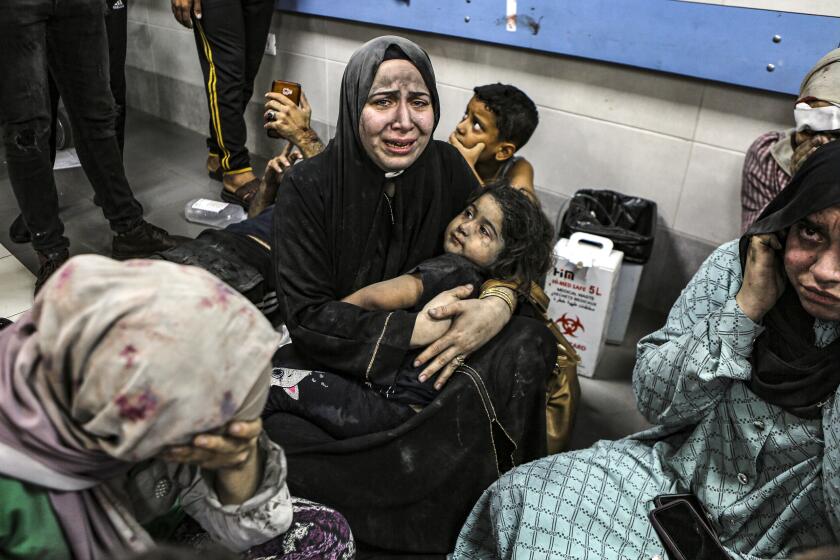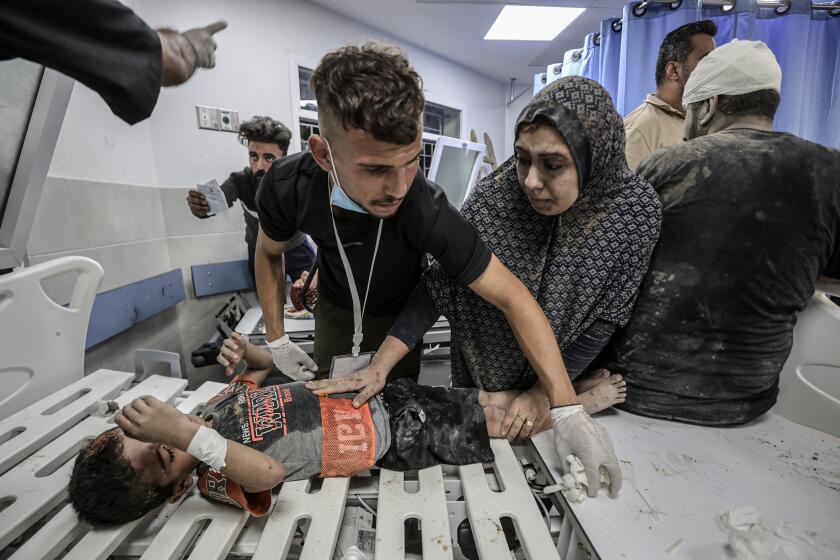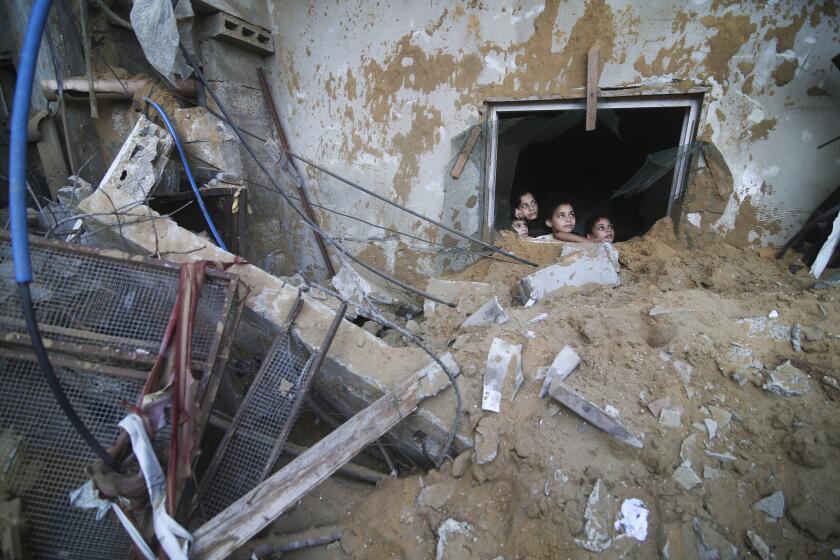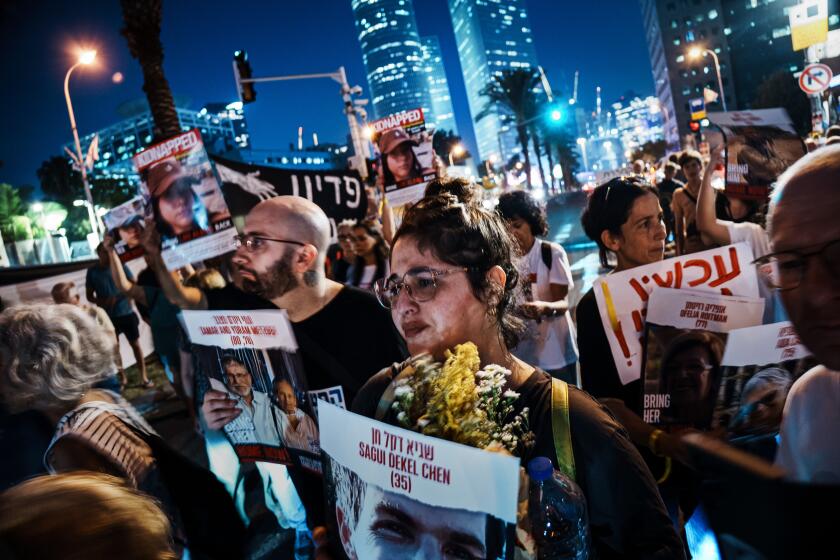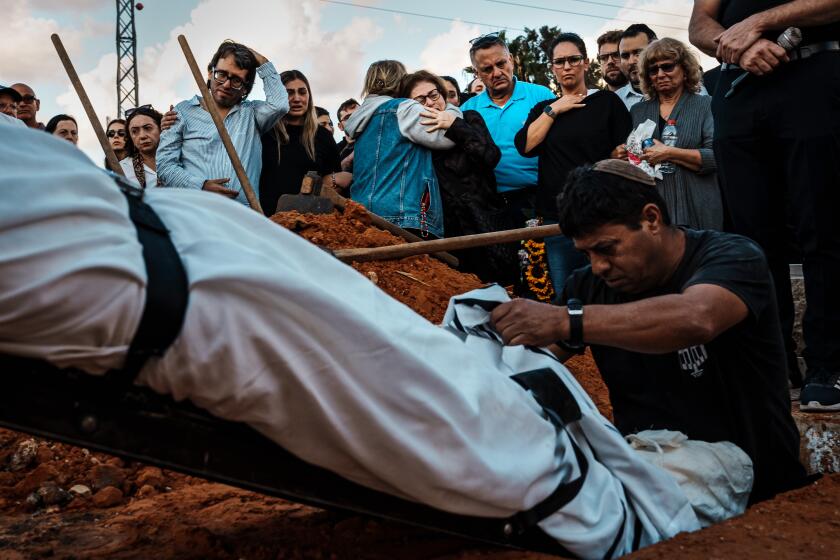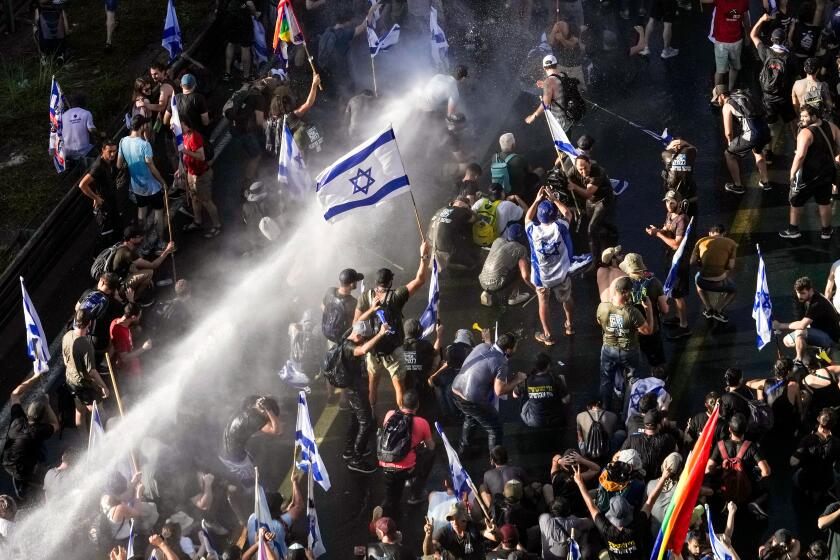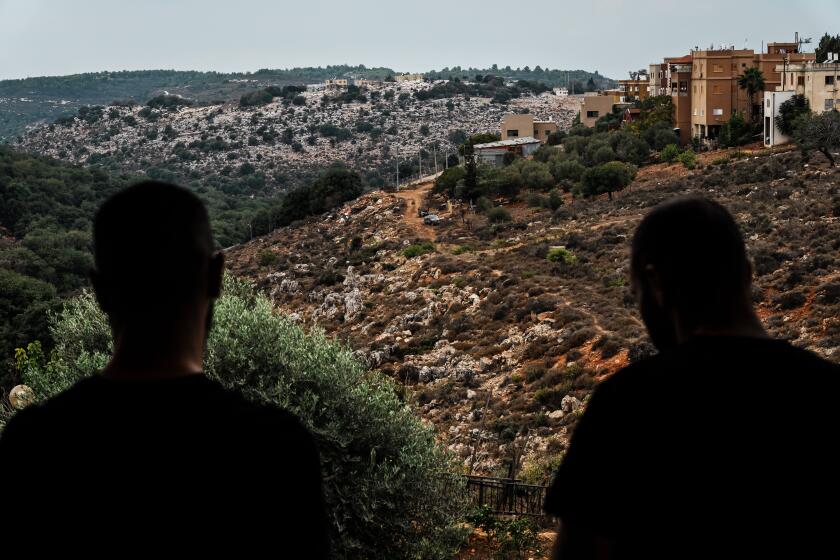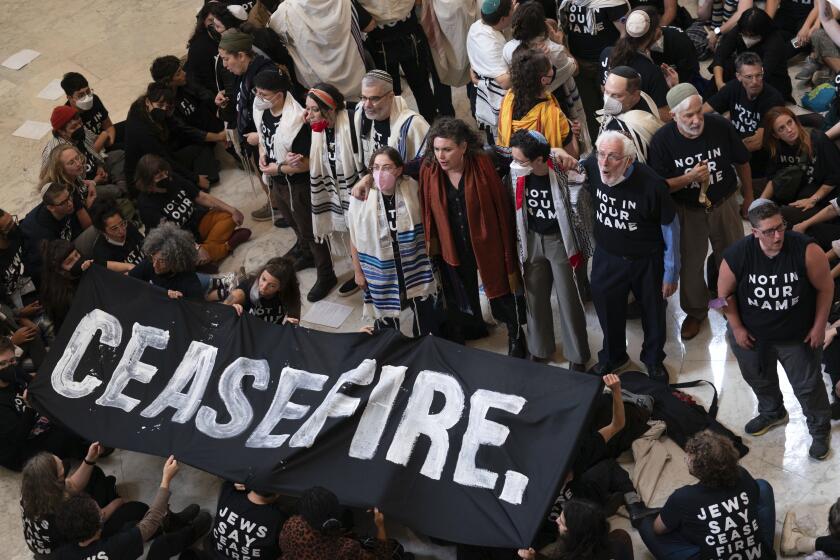‘He isn’t Winston Churchill.’ Despite anger and blame, war buys time for Netanyahu, Israel’s unpopular leader

- Share via
TEL AVIV — Israel is at war, and its longest-serving leader, Benjamin Netanyahu, seems at once everywhere and nowhere.
As the country confronts its gravest security crisis in decades, set off by a devastating surprise attack by the Palestinian militant group Hamas that killed 1,400 people in southern Israel, the prime minister has carried on with some high-profile political appearances — but has also been strangely absent from public life at a moment of dire national emergency.
With the war appearing to enter an intense new phase Friday night, Netanyahu has been spending his days visiting world leaders, donning body armor for well-documented field visits to Israeli military units and delivering carefully scripted communiques about an all-out battle being joined with Hamas.
But the 74-year-old prime minister — once hailed for formidable skills as a retail politician, famous for his charismatic sway over millions of stalwart supporters — has eschewed inspirational tasks traditionally embraced by wartime leaders: visits to hospitals, paying respects at the funerals still taking place daily across the country, touring the staging grounds of ubiquitous Israeli volunteer drives to support the troops and aid war victims.
“He isn’t Winston Churchill, to whom he likens himself,” one of Netanyahu’s most vehement critics, former diplomat Alon Pinkas, wrote in the Israeli newspaper Haaretz. “No one looks up to him at the ultimate moment of tragedy and crisis.”
Netanyahu has good reason to avoid spontaneous encounters with the Israeli public. Some of his hard-right ministers who ventured out into emotionally charged settings after Hamas tore a swath of carnage through quiet southern Israeli communities have been shouted down by angry citizens or had cups of coffee hurled in their direction.
Israel and the Palestinian militant group Hamas appear set to go head-to-head on the ground in Gaza. What’s each side’s endgame?
Fueling the sense of crisis, the war’s direction is far from clear, though seemingly moving closer to an all-out ground invasion of Gaza, Hamas’ home turf.
On Friday night, the enclave was hit with some of the heaviest bombing yet, said by the Israeli military to target Hamas’ extensive network of tunnels.
As Israel announced expanded ground operations were taking place, internet and phone service was heavily curtailed inside Gaza.
But international pleas for restraint have grown along with Palestinian suffering. Densely populated Gaza has become a deathtrap for its 2.3 million residents; aid groups recount harrowing scenes of surgery without anesthesia as the healthcare system collapses, entire families buried under rubble by bombardment, and at least half the population displaced, seeking haven where there is none to be found.
After a hospital blast in Gaza, doctors struggling to save lives amid danger and dwindling supplies say they and the medical system are near collapse.
In three weeks of intense Israeli air and artillery strikes, the Palestinian death toll has soared past 7,300, according to local health officials.
With Israeli public confidence in the government and the prime minister at historical lows, most believe that a reckoning, in some form or another, will come for Netanyahu, who was already in a battle for his political life when Hamas militants staged their unprecedented cross-border attack.
But no one knows when that day of judgment might arrive, or how.
Hundreds of Palestinian Americans are reportedly stranded in Gaza, frantically searching for ways to flee before Israel’s expected ground assault.
“Yes, yes, the political Houdini — we really don’t know if he will escape again this time,” said political analyst Ofer Koenig of the Israel Democracy Institute.
Netanyahu, he said, is “constantly thinking of political survival, of the day after, of how to shape the narrative in his favor.”
A cavalcade of senior Israeli military and security officials — the army chief of staff and the head of domestic intelligence, among others — have publicly accepted culpability for immense security failings on and before Oct. 7, when it took the Israeli army at least a full day to halt a Hamas onslaught during which more than 200 people were abducted, and hundreds of Israeli civilians were tortured, mutilated and their bodies burned.
Israel-Hamas war: In a national vigil of sorts, Israelis hope for the return of more than 220 people seized by militants and believed held in Gaza.
Israel has called the bloodletting not only the worst single-day civilian fatality toll since the creation of the state 75 years ago, but the deadliest day for Jews since the Holocaust.
Until this week, Netanyahu had remained pointedly silent on the subject of accountability for lapses that led to the massacre. But in an address to the nation on Wednesday night, he gave the first indication that he expected his own actions to be part of an expected postwar inquiry.
“Everyone will have to give answers on the debacle, including me,” he said. “But all that will happen only after the war.”
Israel-Hamas war: In Israel, a quest to identify unrecognizable bodies. In Gaza, bodies are piled and some stored in ice cream trucks as power fails.
Opinion polls suggest 80% of Israelis believe Netanyahu should accept responsibility for failures that led to the Hamas attack. But Israeli analysts and media accounts suggest that the prime minister and his senior aides are already preparing to blame Israel’s security establishment.
Many critics of the prime minister contend that the army was over-deployed in the West Bank at the time of the Hamas attack, leaving the Gaza frontier dangerously undermanned — in large measure due to Netanyahu’s far-right government condoning a wave of violence by extremist Jewish settlers in the West Bank, and using the army to quell Palestinian unrest.
Before the war broke out, Netanyahu was the target of enormous street protests calling for his removal over his far-right government’s plans to hamstring Israel’s independent judiciary, as part of a larger agenda of anti-democratic moves.
The prime minister is fighting an array of corruption charges, and critics say that since resuming office after a hiatus of 18 months, his principal aim has been not governance, but simply staying out of jail.
Even so, many Israelis believe wartime is the wrong time to press for a leadership change. When Hamas fighters attacked, the broad coalition that had been attempting to oust Netanyahu immediately broke off its mass demonstrations and turned instead to civil-society volunteer efforts, such as setting up clearinghouses for donated goods and providing housing for tens of thousands of war-displaced Israelis.
“We pivoted, and we pivoted very, very quickly,” said Terry Newman of the group Brothers and Sisters in Arms. Prior to the war, the organization had spearheaded a campaign by military reservists who threatened not to report for duty — an obligation and ethos that long cut across political lines in Israel — if Netanyahu and his allies pressed ahead with their program of judicial “reforms.”
After Netanyahu’s moves against the judiciary, can Israel, long heralded as the only democracy in the Middle East, still claim the title?
Now many of the group’s reservist members have rejoined their units in the country’s south, near the Gaza frontier, and the north, where the Lebanese militia Hezbollah, a far more professional fighting force than Hamas, has threatened to join in the attack on Israel.
Over the course of his long public life, Netanyahu has survived scandals that would sink most politicians, and has casually discarded longtime alliances when expediency beckoned. Even after the political exile that followed his fall from power in 2021 — amid a series of inconclusive elections and coalition-building failures — he bounced back, forming the most hard-right government in the country’s history.
The charges against him, including bribery, fraud and breach of trust, served as the backdrop for a wide-ranging attack on the country’s judiciary.
In language echoing that of his erstwhile ally Donald Trump, Netanyahu repeatedly proclaimed his innocence, denouncing the charges against him as a prosecutorial “witch hunt.”
Despite it all, Netanyahu still has his unyielding partisans, said Israeli pollster Dahlia Scheindlin, who foresees a long-term hardening of far-right sentiment that could favor the prime minister.
On Israel’s border with Lebanon, residents are worried that groups like Hezbollah will join a war that eventually spirals into a regionwide conflict.
“I think it’s not clear-cut he will be gone after this, as some people think,” she said.
Over his long years in power, Netanyahu cultivated an image as an implacable guardian of Israel’s security — an image tarnished by Israelis’ newfound sense of vulnerability. But some say a clear and present danger is all the more reason to act.
“He has to go, and he has to go now,” said a tearful Michal Avinatan, a pensioner demonstrating in Tel Aviv alongside families of hostages. “All of this — all of it! — is his fault.”
‘Our human ask is that people give a damn when we die,’ said one rabbi. Amid the Israel-Hamas war, many U.S. Jews feel betrayed by people they thought were allies.
Regardless of whether he stays or goes, Israel will be left to cope with “generational trauma” as a result of the Hamas attack, said journalist Anshel Pfeffer, author of a Netanyahu biography.
“I’m no prophet. There are many different possible scenarios,” he said. “I think it is the beginning of the end. But Netanyahu will try to hold on — to hold on for as long as he can.”
More to Read
Sign up for Essential California
The most important California stories and recommendations in your inbox every morning.
You may occasionally receive promotional content from the Los Angeles Times.
